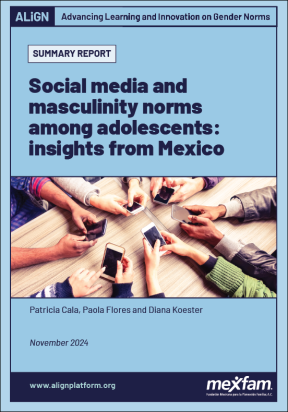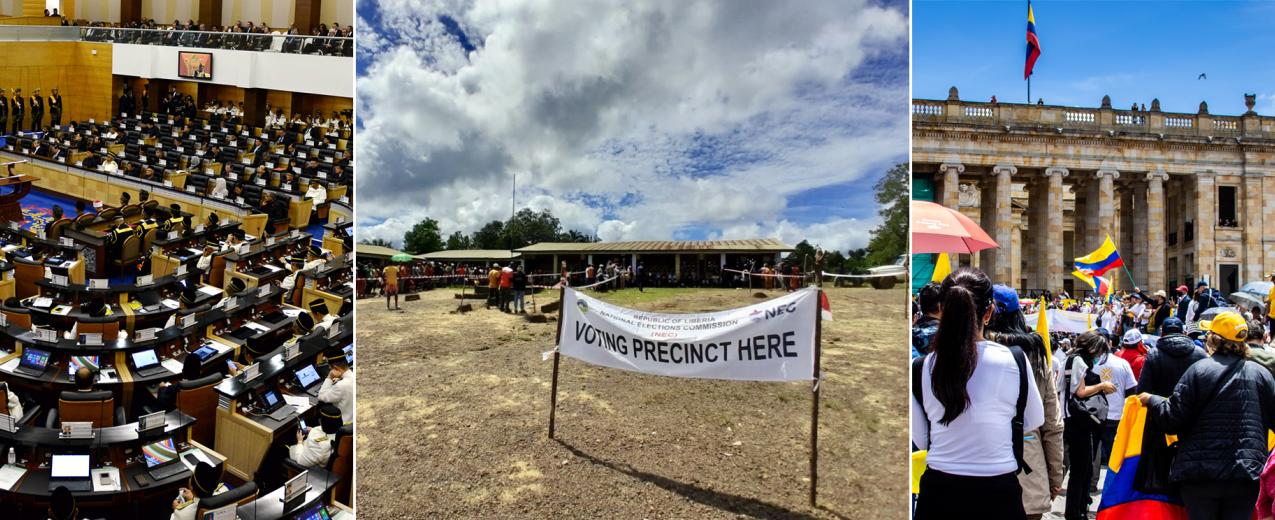
- Blog
- 28 Mayo 2024
According to the World Economic Forum, it will take more than 162 years to close the gender gap in politics. Inequality between men and women in politics persists despite centuries of legal, political and social activism by feminists and women’s organisations. So, what could help to close this gap faster and transform the gender norms that perpetuate men’s privilege and domination in politics?
To answer this question, the ALIGN programme carried out a year-long collaborative research project with partners in Colombia, Liberia and Malaysia to explore how men in positions of political power can help to change the patriarchal system. Men in politics – as feminists, allies or as advocates for equality and justice – given the power and influence they yield, can play a critical role. They can, for example, work collectively to change the misogynist culture within political parties that blocks women’s rise to leadership positions. They can also act as role models for behaviour that challenges views on what it means to be a male leader – views that are often based on aggression, protectionism or violence.
It is not easy, however, for men politicians to take up the mantle of feminism and gender equality. Being in power – and wanting to stay there – means they are influenced by their peers and institutions to maintain the status quo. They also face potentially negative consequences from the voting public if they associate themselves too closely with feminism, which is largely misunderstood and misrepresented in society. Despite these limitations, male politicians are crucial for promoting lasting change.
Our new ALIGN research reveals some key factors that motivate and enable men’s engagement with gender equality: gender justice being viewed as a moral imperative; the existence of strong national feminist movements; and the recognition of the risks of adopting a feminist label in some contexts. These factors can be reproduced to encourage more men in politics to play a transformative role on gender equality.
Liberia: engaging with gender equality as a moral imperative
Liberia is known for having the first elected female president in Africa, Ellen Johnson Sirleaf, who served two terms from 2006 to 2018. Several other notable Liberian women have served at the highest levels of government, including Ruth Sando Perry (interim President, 1996-1997), and Jewel Howard Taylor (Vice President, 2018-2024). Yet, despite the presence of these strong women leaders, or ‘Liberia’s Iron Ladies’, as they have been called, the term feminism remains an unpopular and almost derogatory term in Liberian politics.
Our research found that both women and men politicians shy away from using the term, even when their policies and legislative actions clearly promote gender equality. For example, the men interviewed preferred to be labelled advocates for women’s rights or as ‘HeforShe’ – a term popularised by a United Nations campaign over a decade ago.
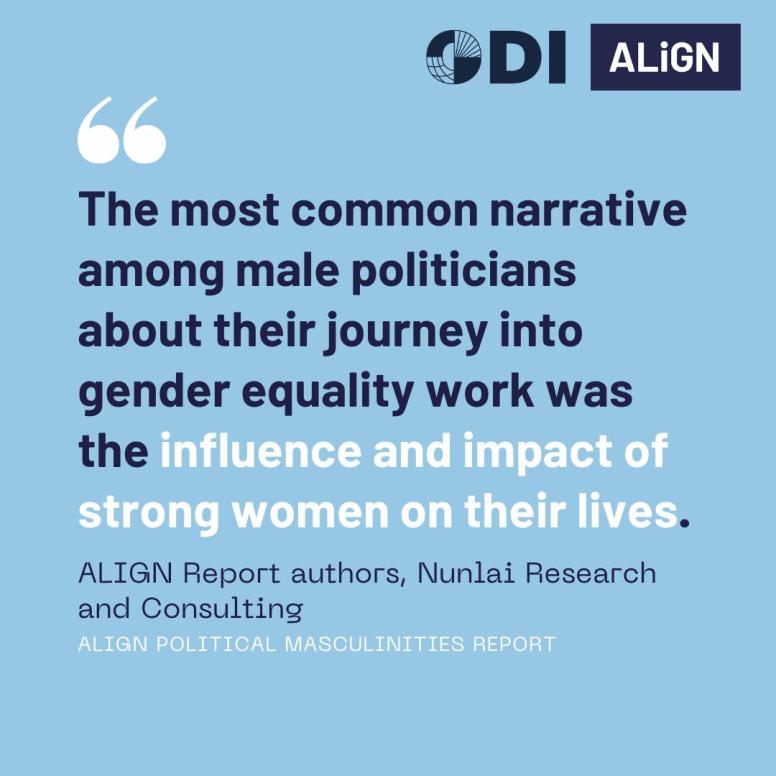
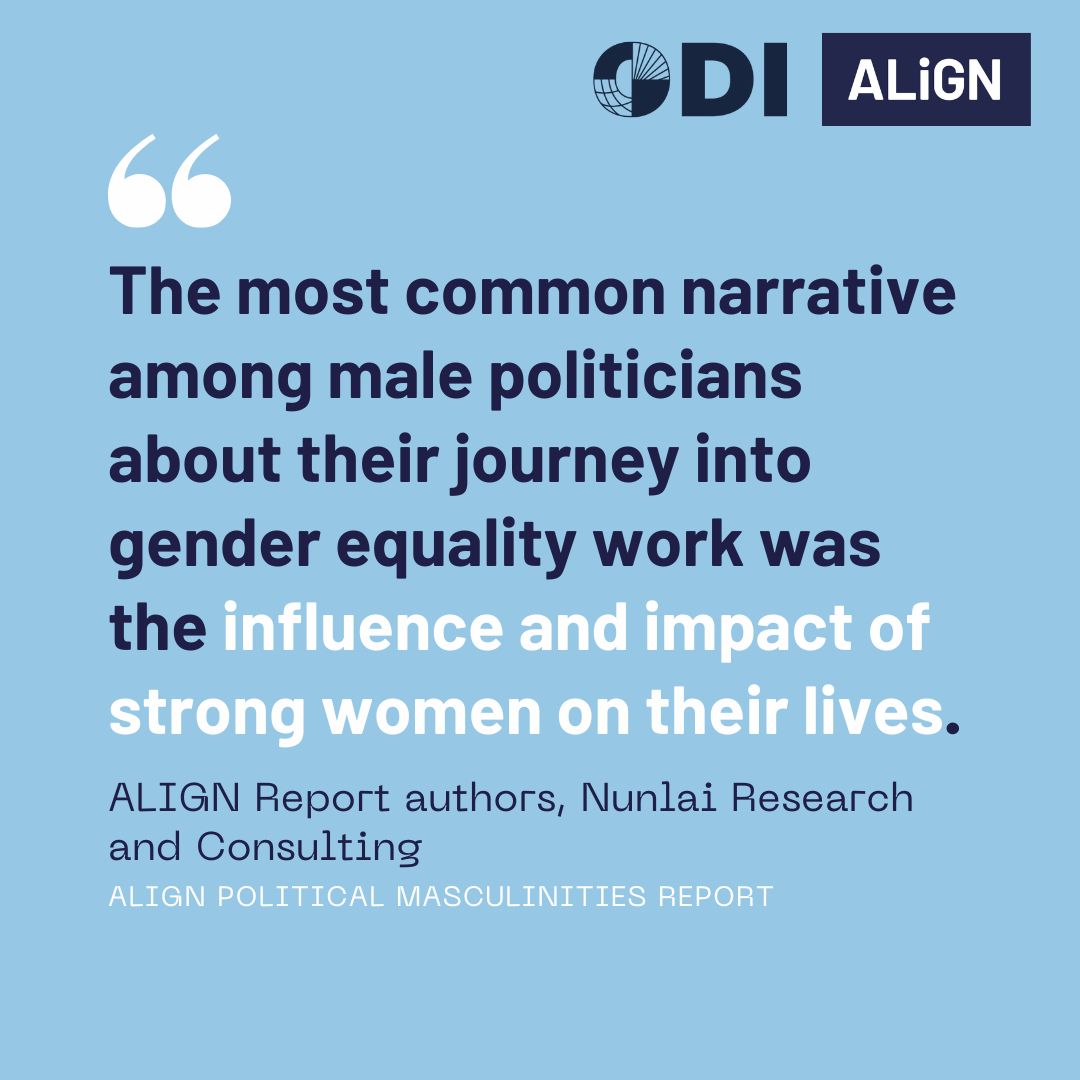
Many of the Liberian men we spoke to were advocates for women’s rights, not in the name of feminism, but because they saw gender equality as a moral imperative for Liberia’s development progress. Several male politicians noted the examples of female leadership, such as the former president. However, the most common underlying motivation for their gender equality work was the positive impact of strong women in their lives – particularly their mothers and wives – on their own personal and professional trajectories.
This key finding reveals the importance of personal relationships and human experiences in strengthening momentum behind gender equality initiatives. To put it simply, they make the injustices of inequality more tangible and bring them close to home.
Colombia: the role of strong feminist movements in engaging men as allies
Colombia has a long history of movements for the rights of women and LGBTQI+ people – movements that have generated major legal and public policy changes. Some of their gains, such as their innovative inclusion of gender perspective in post-conflict transitional justice processes, have attracted international interest. These movements have faced intense opposition from public opinion, policy makers and politicians, but a growing number of male politicians in Colombia want to understand gender issues and strengthen their commitment to gender equality.
In defining themselves as ‘allies’, the research found that such politicians express solidarity and empathy with gender equality and feminism, positioning themselves within broader political agendas of equality, social justice and human rights. But their understanding of allyship lacks clarity and is disconnected from mid- to long-term action for social change. This risks instrumentalising gender and feminist agendas.
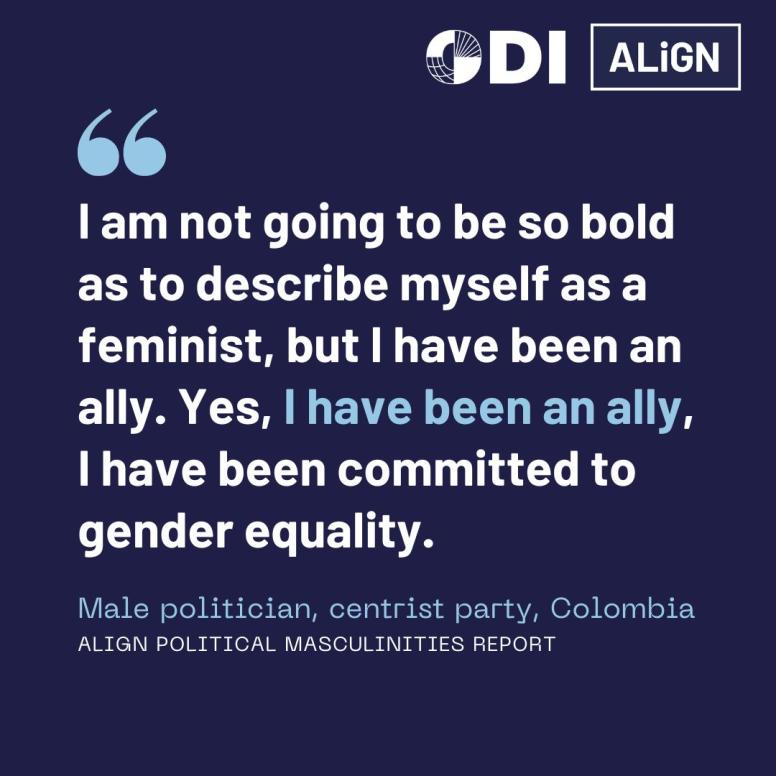
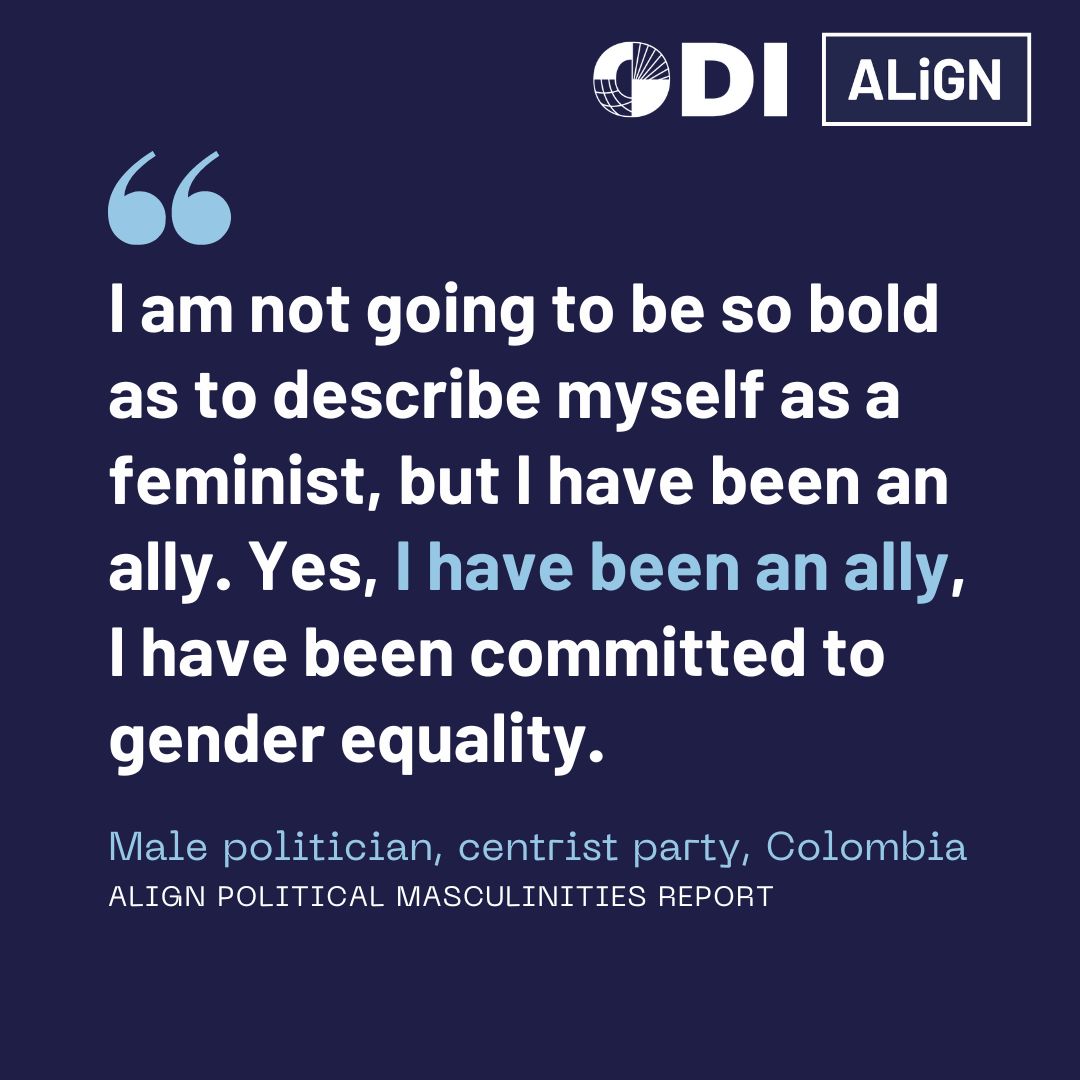
Those whose allyship is rooted in a long-term commitment to feminist, LGBTQI+ rights and other social movements seem to achieve better and more sustained results. One politician was able to mainstream gender in several public policies as a result of his previous work with women’s organisations, and his participation in related study groups and academic events.
The risk to individuals when they express simplistic allyship can be reduced by working in teams and networks with committed organisations and experts in gender and policy making. As one politician said, his team was a key factor in selecting and promoting the initiatives he supports on gender equality.
Malaysia: recognise the risks of adopting a feminist label in specific contexts
Men still hold most leadership positions in Malaysia, particularly in politics, where the highest share of seats held by women in Parliament since the country’s independence has been just 14.4% (2022). Given their dominance, an exploration of the views of Malaysian male politicians on gender equality and women's empowerment is crucial for advancing a national gender equality agenda.
Our research found that gender equality faces unique challenges in Malaysia as a result of cultural and religious currents marked by significant resistance to ideas perceived as Western. It is risky to label yourself as a feminist or even as a gender equality advocate, because some public and political spheres are increasingly conservative. The male politicians in our study, for example, avoid direct alignment with the feminist label to minimise resistance from conservative or traditionalist groups. Instead, they describe themselves as advocates of a conceptually ‘broader’ cause, calling themselves ‘humanist’ for example.
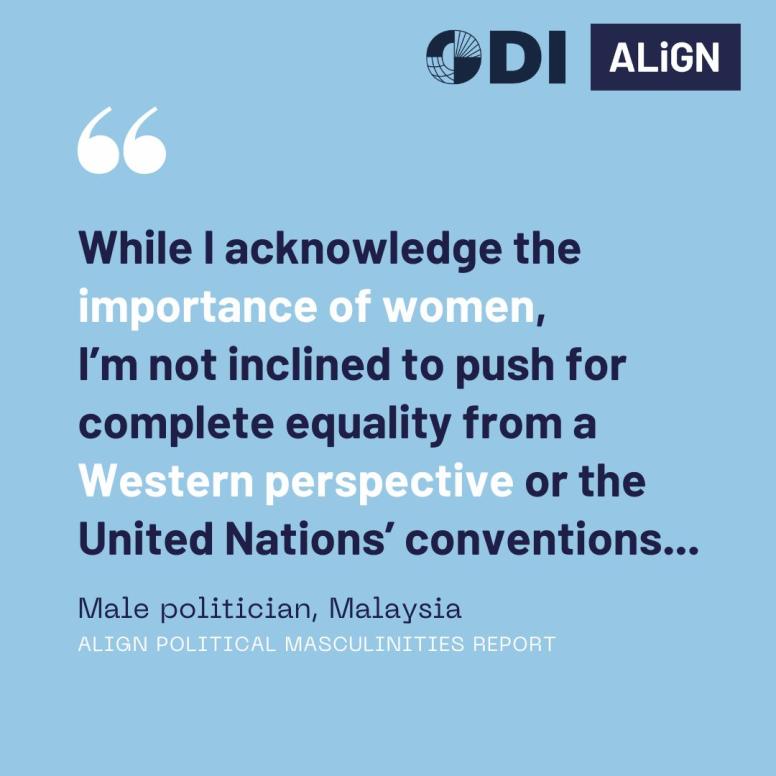
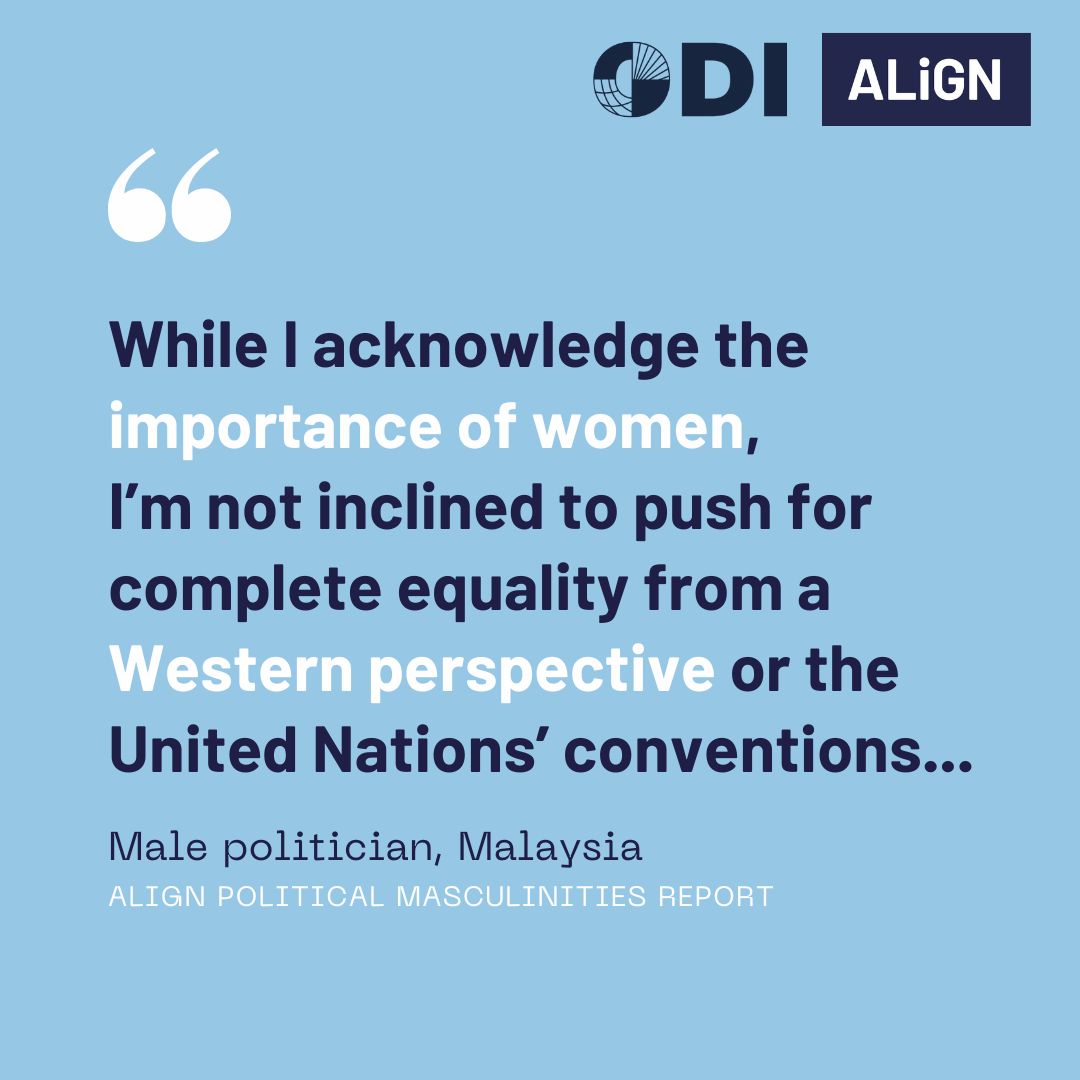
Engagement with male politicians to promote gender equality may, therefore, have more traction if it focuses on specific and more ‘acceptable’ issues, such as women's economic empowerment or efforts to end gender-based violence (GBV). This may be an easier way to advance the cause of equality than, for example, a focus on LGBTQI+ rights, which tend to be denounced or avoided.
Ultimately, working with male politicians as allies to advance gender equality in Malaysia requires judicious navigation of their different understanding of gender equality, a more conscious effort to broaden their knowledge of national and global gender issues, and the dispelling of persistent misunderstandings and myths that are often based on cultural and religious perspectives about women, men and gender relations.
How to engage more men as gender equality allies in politics
As the findings from Liberia, Colombia and Malaysia show, men in politics navigate a complicated terrain when they take up the cause of gender equality as allies. Their decision is a calculation that weighs their personal motivations on the one hand, and societal and institutional factors on the other, such as the presence of women in political institutions, the demands of strong feminist movements or global narratives of Westernisation and progress.
These factors shape how they demonstrate their commitment to gender equality – whether they are just silent sympathisers or take a proactive role and develop their own initiatives. But no matter where they stand on this spectrum, men who are feminist allies and gender equality advocates can take action.
They can, for example, appoint women as candidates, promote them to leadership roles in political parties, and speak out on sexual harassment. Our research emphasises how taking action is a vital part of allyship that moves the commitments of politicians forward. This matters because male politicians are viewed with scepticism by activists, young people and by women politicians – both because they are men and because they are politicians. So, while the rallying calls for all of us to be feminists are important symbolic acts that help to normalise and demystify feminism – and must continue – they must go hand in hand with concrete action by male politicians to transform harmful gender norms.
Related resources
2 November 2020
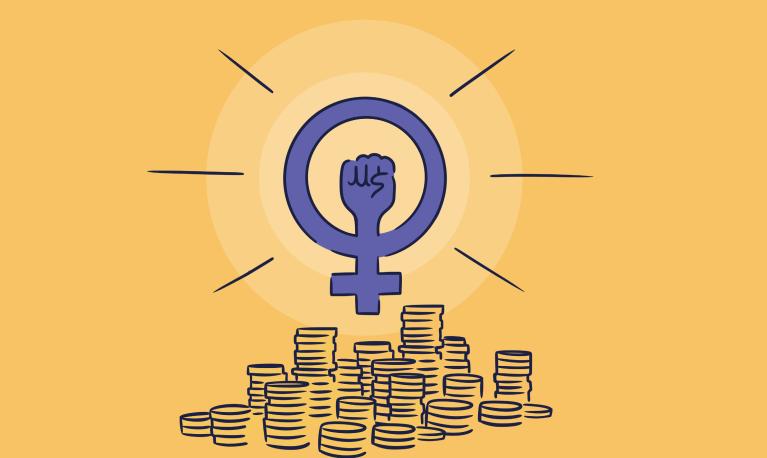
16 May 2024
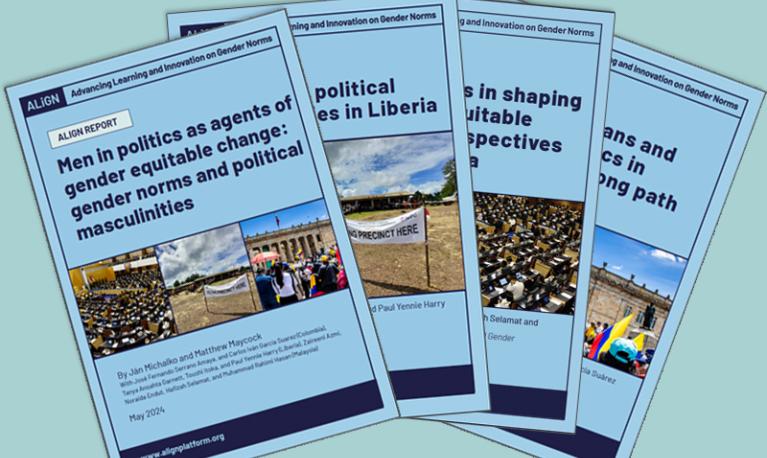
Blog
14 Abril 2025

Blog
10 Febrero 2025

Blog
19 Diciembre 2024
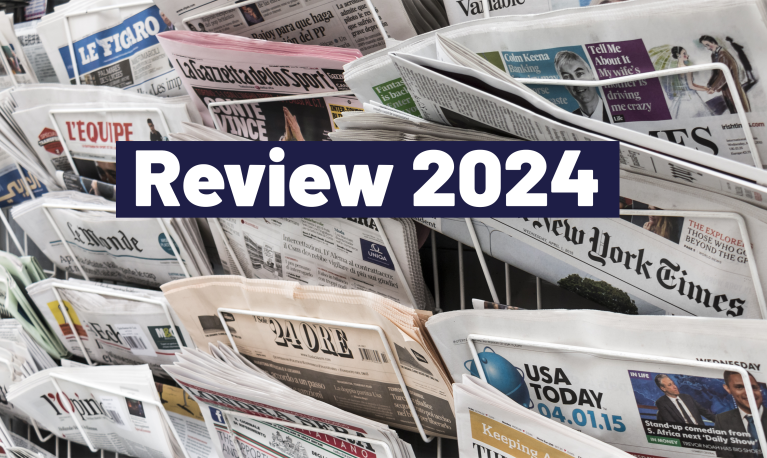
Report
19 Noviembre 2024
